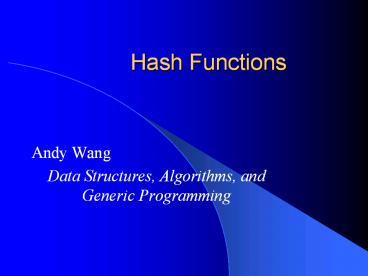Hash Functions - PowerPoint PPT Presentation
Title:
Hash Functions
Description:
Hash(K) = rand() What is wrong? Not repeatable. How About... K P, P = prime number. Hash(K) = rand(K) % P. Better randomness. Can be expensive to compute random ... – PowerPoint PPT presentation
Number of Views:355
Avg rating:3.0/5.0
Title: Hash Functions
1
Hash Functions
- Andy Wang
- Data Structures, Algorithms, and Generic
Programming
2
Introduction
- Hash function
- Maps keys to integers (buckets)
- Hash(Key) Integer
- Ideally in a random-like manner
- Evenly distributed bucket values
- Even if the input data is not evenly distributed
3
An Example
- ID Number Generation
- Key your name
- Hash(Key) a number
- Not a great hash function
- Two people with the same name will have the same
number
4
Simple Hash Functions
- Assumptions
- K an unsigned 32-bit integer
- M the number of buckets (the number of entries
in a hash table) - Goal
- If a bit is changed in K, all bits are equally
likely to change for Hash(K)
5
A Simple Hash Function
- What if K M?
- Hash(K) K
- What is wrong?
- Your student ID SSN
- I cant use your SSN to post your grades
6
Another Simple Function
- If K gt M
- Hash(K) K M
- What is wrong?
- Suppose M 4, K 2, 4, 6, 8
- K M 2, 0, 2, 0
7
Yet Another Simple Function
- If K gt P, P prime number
- Hash(K) K P
- Suppose P 3, K 2, 4, 6, 8
- K P 2, 1, 0, 3
- More uniform distributionbut still problematic
for other cases
8
More on Prime Numbers
- K gt P1 gt P2, P1 and P2 are prime numbers
- Hash(K) (K P1) P2
- Suppose P1 5, P2 3, K 2, 4, 6, 8, 10
- (K 5) 2, 4, 1, 3, 0
- (K 5) 3 2, 1, 1, 0, 0
- Still uniform distribution
9
Polynomial Functions
- If K gt P, P prime number
- Hash(K) K(K 3) P
- Slightly better than pure modulo functions
10
How About
- Hash(K) rand()
- What is wrong?
- Not repeatable
11
How About
- K gt P, P prime number
- Hash(K) rand(K) P
- Better randomness
- Can be expensive to compute random numbers
12
Pre-generated Randomness
- Two prime numbers P1 and P2
- K gt P1 and K gt P2
- A table RP1, with Ri pre-initialized to
rand(i) P2 - Hash(K) RK P1
- Slight Problem Possible duplicate mapping
13
To Avoid Duplicate Mapping
- Two prime numbers P1 and P2
- K gt P1 and K gt P2
- A table RP1, with Ri pre-initialized to
unique random numbers - Hash(K) RK P1
14
An Example
- K 0232, P1 3, P2 5
- R3 0, 4, 1
- Hash(K) RK 3
15
Hashing a Sequence of Keys
- K K1, K2, , Kn)
- E.g., Hash(test) 98157
- Design Principles
- Use the entire key
- Use the ordering information
- Use pre-generated randomness
16
Use the Entire Key
- unsigned int Hash(const char Key)
- unsigned int hash 0
- for (unsigned int j 0 j lt K j)
- hash hash Keyj
- return hash
- Problem Hash(ab) Hash(ba)
17
Use the Ordering Information
- unsigned int Hash(const char Key)
- unsigned int hash 0
- for (unsigned int j 0 j lt K j)
- hash hash Keyj
- hash / hash with some shiftings /
- return hash
- Problem H(short keys) will not perturb all
32-bits (clustering)
18
Use Pre-generated Randomness
- unsigned int Hash(const char Key)
- unsigned int hash 0
- for (unsigned int j 0 j lt K j)
- hash hash RKeyj
- hash / hash with some shiftings /
- return hash
19
CRC Variant
- Do 5-bit circular shift of hash
- XOR hash and Kj
- for ()
- highorder hash 0xf8000000
- hash hash ltlt 5
- hash hash (highorder gtgt 27)
- hash hash Kj
20
CRC Variant
- For long keys, all 32-bits are exercised
- More randomness toward lower bits
- - Not all bits are changed for short keys
21
BUZ Hash
- Set up an array R to store precomputed random
numbers - for ()
- highorder hash 0x80000000
- hash hash ltlt 1
- hash hash (highorder gtgt 31)
- hash hash RKj
22
References
- Aho, Sethi, and Ullman. Compilers Principles,
Techniques, and Tools, 1986. - Cormen, Leiserson, River. Introduction to
Algorithms, 1990 - Knuth. The Art of Computer Programming, 1973
- Kuenning. Hash Functions, 2003.































